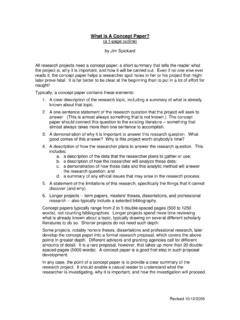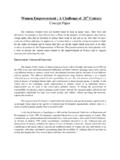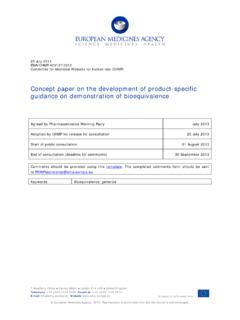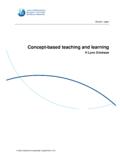Transcription of What is Sustainable Development Law
1 what is Sustainable Development Law? A CISDL concept Paper1. Montreal, 2005. what is Sustainable Development , and what , in particular, is international law on Sustainable Development '. (or in short, Sustainable Development law')? Certain international processes have provided guidance, and commonly accepted elements of answers, to these questions. Sustainable Development is most commonly defined as Development that meets the needs of the present without compromising the ability of future generations to meet their own needs.
2 2 In short tautology, it means Development that is Sustainable .' Development can be defined as a collective process of change toward improvements in quality of life for human beings and their communities, and sustainability can be seen to refer to the need for Development to be integrated, socially, economically and environmentally sound, oriented to the long-term, and hence, able to last. For the CISDL, the concept of Sustainable Development , in international law, requires accommodation, reconciliation and integration between economic growth, social justice (including human rights)
3 And environmental protection objectives, towards participatory improvement in collective quality of life for the benefit of both present and future The term Sustainable Development law' describes an emerging corpus of international legal principles and instruments which address the intersections between international economic, environmental and social law (including human rights law), towards Development that can last for the benefit of present and future generations. Sustainable Development in International Policy Our Common Future, the influential 1987 Brundtland Report, sought for solutions to parallel problems of global environmental degradation and global lack of social and economic Development , by asking for these challenges to be addressed in an integrated way, for the interests of present and future generations.
4 In the Brundtland Report, as mentioned above, Sustainable Development was defined as Development that meets the needs of the present without compromising the ability of future generations to meet their own needs. 4. At the United Nations Conference on Environment and Development , in the 1992 Rio Declaration, States committed to the further Development of international law in the field of Sustainable Development . (Principle 27). In the 1992 Agenda 21 States elaborated that this involved the further Development of international law on Sustainable Development , giving special attention to the delicate balance between environmental and developmental concerns ( ).
5 In the 1997 Programme of Action for Further Implementation of Agenda 21, States further agreed that it is necessary to continue the progressive Development and, as and when appropriate, codification of international law related to Sustainable Development . Relevant bodies in which such tasks are being undertaken should cooperate and coordinate in this regard. (para. 109). The 2002 World Summit on Sustainable Development Johannesburg Declaration specifically commits to assume a collective responsibility to advance and strengthen the interdependent and mutually reinforcing pillars of Sustainable Development - economic Development , social Development and environmental 1 This paper is based on legal research published in Cordonier Segger & A.
6 Khalfan, Sustainable Development Law: Principles, Practices & Prospects (Oxford: Oxford University Press, 2004); Cordonier Segger & C. G. Weeramantry, eds., Sustainable Justice: Reconciling Economic, Social and Environmental Law (Leiden: Martinus Nijhoff, 2004) and M. Gehring & Cordonier Segger, eds., Sustainable Development in World Trade Law (The Hague: Kluwer Law International, 2005), and should be cited to these books, as appropriate. 2 World Commission on Environment and Development , Our Common Future (Oxford: Oxford University Press, 1987).
7 This definition focuses, according to the Report, on the concept of needs, in particular the essential needs of the world's poor, to which overriding priority should be given, and the concept of limitations (imposed by the state of technology and social organisation) on the ability of the environment to meet present and future needs. 3 Cordonier Segger & A. Khalfan, Sustainable Development Law: Principles, Practices & Prospects (Oxford: Oxford University Press, 2004). See also Cordonier Segger & C. G. Weeramantry, eds, Sustainable Justice: Reconciling Economic, Social and Environmental Law (Leiden: Martinus Nijhoff, 2004).
8 4 Supra note 2. The Report states: The members of the World Commission on Environment and Development came from 21 very different nations. [..] We are unanimous in our conviction that the security, well-being, and very survival of the planet depend on such changes, now.. protection - at the local, national, regional and global levels (para. 5). The Johannesburg Plan of Implementation mandated the UN Commission on Sustainable Development to (e) Take into account significant legal developments in the field of Sustainable Development , with due regard to the role of relevant intergovernmental bodies in promoting the implementation of Agenda 21 relating to international legal instruments and mechanisms.
9 (para 148 at e). Sustainable Development in International Law In international law, the concept of Sustainable Development has gained some definition over the course of the past two decades. It is not clear that Sustainable Development has, as yet, the character of a customary norm of international But neither is it void of all meaning or normative value in international law. Rather, it can be argued that the concept of Sustainable Development has a dual nature in international law. It can be considered an interstitial norm, which serves to reconcile other conflicting norms related to the environment, the economy and social Development (including human rights),6 and also simply the object and purpose of many international treaties and legal instruments.
10 In the recent decisions of international courts and tribunals, the concept of Sustainable Development facilitates the reconciliation and integration of other norms concerning socio-economic Development and protection of the environment. It appears to have played such a role in Gabcikovo Nagymaros Case at the International Court of Justice: Throughout the ages, mankind has, for economic and other reasons, constantly interfered with nature. In the past, this was often done without consideration of the effects upon the environment.






